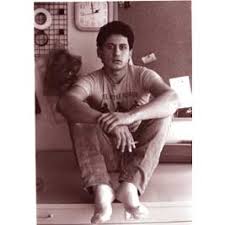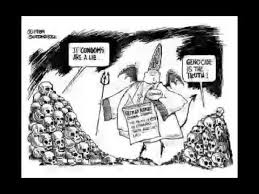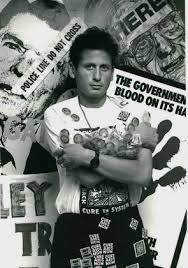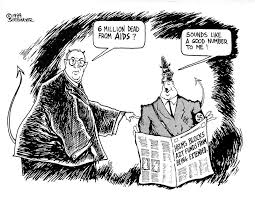Danny Sotomayor Acted Up!
- owenkeehnen25
- Dec 6, 2018
- 3 min read
Updated: Dec 9, 2018
From the 2008 book Out and Proud in Chicago.
Daniel Sotomayor was born in 1958 and grew up in poverty in the Humboldt Park area of Chicago. Initially he wanted to be an actor and studied his craft at Center Theatre. He also graduated with a degree in graphic arts from Columbia College.
Sotomayor's life changed dramatically with his AIDS diagnosis in 1988. In autumn of that year, after experiencing the power of ACT UP/New York at the Food and Drug Administration demonstration in Rockville, Md., Sotomayor returned to Chicago transformed. Along with Paul Adams, Lori Cannon and many others, he helped create the Chicago chapter of ACT UP (the AIDS Coalition to Unleash Power), and Sotomayor soon became a highly visible member of the organization. His colorful HIV-awareness and safe-sex T-shirts, buttons and protest posters helped give the fledgling organization a visual identity and raised needed funds.
Sotomayor also gained notoriety in the activist community for his tireless confrontation of Mayor Richard M. Daley on the issue of AIDS rights and funding. His relentless protests of the mayor's policies included frequent verbal challenges and even the unfurling of a banner at a black-tie gala that read, "Daley, Tell the Truth About AIDS." Daley once said of him, "Why is that man always screaming at me?" Sotomayor's unrelenting tactics are considered a major factor in Daley's significant increase in AIDS funding during the early 1990s.
On April 24, 1990, ACT UP/Chicago sponsored the National AIDS Action for Healthcare demonstration, a daylong event that consisted of 5,000 to 6,000 protesters clogging the downtown area and targeted the practices of the American Medical Association and the insurance industry in regard to the AIDS epidemic. Sotomayor, Adams, Tim Miller and Billy McMillan emerged with banners flying atop a balcony of the Cook County Building on Clark Street to the cheers of the crowd on the street below.
Eventually Sotomayor and ACT UP/Chicago parted ways. Sotomayor contended that AIDS was the group's primary focus and opposed widening its focus to include class, gender and race issues. Sotomayor continued his activism with a new direct action group, Cure AIDS Now.
Sotomayor's in-your-face methods and on going struggle for his own life as well as the welfare of other persons with AIDS (PWAs) was the subject of the Public Broadcasting Service documentary film Short Fuse. His life was also chronicled in a Chicago Reader cover article, "The Angriest Queer." In the Reader piece, Sotomayor remarked, "This isn't a popularity contest, you know. I really don't care whether people like me, or whether they approve of my style or my methods. The question is whether I'm right and whether we're making progress. Because if we are, then fuck 'em."
That focus and that combative nature were also apparent in Sotomayor's cartoons. In 1989 he became the first nationally syndicated, openly gay editorial cartoonist. During his three-year career with such publications as Gay Chicago, Windy City Times, Outlines, Heartland, the Bay Area Reporter, the San Francisco Sentinel, OutWeek, and Au Courant, Sotomayor contributed more than 200 cartoons that cut to the heart of matters with acerbic prowess, tackling such issues as bureaucratic red tape, government indifference, pharmaceutical company greed, the health care system, insurance companies, the demonizing policies of the church, and numerous other issues faced by PWAs.
In the midst of his ongoing struggle with outside forces, Sotomayor's own AIDS battle continued. Through much of 1991 and into 1992 Sotomayor and his partner Scott McPherson (author of the acclaimed play Marvin's Room) cared for each other with the help of Cannon and other close friends. Sotomayor eventually succumbed to AIDS at Illinois Masonic Medical Center on Feb. 5, 1992.
Since
his passing there have been several retrospectives of Sotomayor's activism, life, and work.




















Comments